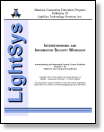Overview: Internetworking and Information Security Workshop
 The Internetworking and Information Security Workshop, our second workshop in the LightSys Missions Computing Education Program, covers the fundamentals of TCP/IP internetworking, network security, and secure communications, using Linux as the platform. The workshop is geared towards those who want to better understand the basics of how to keep a computer, network, and critical information, secure.
The Internetworking and Information Security Workshop, our second workshop in the LightSys Missions Computing Education Program, covers the fundamentals of TCP/IP internetworking, network security, and secure communications, using Linux as the platform. The workshop is geared towards those who want to better understand the basics of how to keep a computer, network, and critical information, secure.
This workshop includes a 200+ page course workbook, presentations and demonstrations of the material, and many hands-on exercises to let you gain experience.
Security Workshop Contents
Below is a brief list of the topics covered.
- Section N: Internetworking: TCP/IP, routing/subnetting, proxying/NAT, tunneling, and policy routing.
- Section F: Network Security: Security policy overview, firewalling, proxying, and intrusion prevention/detection/recovery.
- Section S: Secure Communications: Encryption, SSL, SSH, VPN, secure email, and a secure programming overview.
Q & A...
| 1. | How long does the workshop take? We can offer this workshop in as little as three days, given eight full hours of class/lab time each day. However, in that configuration we cannot offer any other custom sessions, and the workshop will feel very "rushed". Some of the labs are best done when there is plenty of time available. Our recommendation is that you give a full week for this workshop and plan on six hours of class/lab time each day. |
| 2. | What operating system do you use? Traditionally, we have focused on the Red Hat / Fedora / CentOS series of Linux distributions, mainly because they are so common. We focus on Linux because it allows us to use this workshop to complement our Basic Linux workshop. However, the concepts and ideas are for the most part applicable to other operating systems as well. We try to provide the most up-to-date material that we can in any particular workshop. |
| 3. | Does a certification accompany completion of this workshop? We do not currently offer certification. If you think that certification would be of value, please do let us know, as we are considering offering it in the future. |
| 4. | How much does the workshop cost? We do not charge tuition for our workshops. Depending on what venue the workshop is offered in, there may be venue fees for room, board, and materials. If we offer the workshop for your organization at your site, our standard method of ministry applies. |
| 5. | Do you offer the workshop online? We can offer this workshop online. There are no fees for this service. Please contact us for more information. Where possible, however, we do recommend face-to-face instruction instead of online learning. |
| 6. | Are the materials available for me to download? The workshop materials are available via the LightSys Associates Network (LAN). |
| 7. | In what depth is Security covered in this workshop? We only cover the fundamentals. You should consider this workshop a "gettting started" point in your pursuit of an increasing understanding of information security, rather than a "finishing point" of having a thorough knowledge of this expansive topic. |
| 8. | What is the minimum / maximum class size? We have used our workshop materials in the context of a one-on-one consulting situation, as well as in larger (15 to 30) participant classroom-style environments. Maximum class size depends on the venue, and if we hold the course at your facility, that is entirely at your discretion. For classes larger than 10 participants, we recommend that you have on hand at least one person with a reasonably good knowledge of the topics to be covered, for each 10 class participants in excess of 10. For smaller classes, we can conduct the workshop in the context of consulting with you regarding the specific technologies you are using or will use. |
| 9. | What facilities do you require to conduct the workshop? One lab computer (or, virtual machine) per participant is required. You will need a computer (or virtual machine) whose hard drive can be completely overwritten. For in-person workshops (not held online), we recommend a dedicated workstation (non virtual) for each participant. Doing the hands-on exercises in a dual-boot scenario is possible but not recommended unless great care is taken, due to the nature of the hands-on exercises. An available internet connection is important, but the workshop LAN must be on its own segment, not connected to the internet. The availability of a managed switch (supporting 802.1q tagging and VLANs) for dedicated use by the workshop is highly recommended. |




